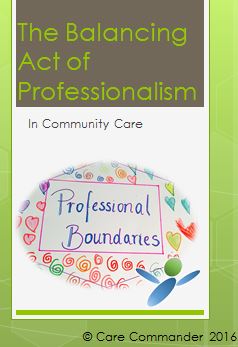
Have you revealed too much of yourself? Have you let your own feelings influence the way you make decisions for your Home Care Recipient? Have your behaviours hindered a therapeutic relationship?
I’m sure you have all heard of Professional Boundaries and that you will performance managed if you breach them, but it’s difficult to stick to them when you are working 1:1 with your Home Care Recipient regularly.
Counsellors and Psychologists train for years on how to balance professionalism with empathy. The complex formula takes skill to perfect and yet in home care service providers are expected to work in homes often on a daily basis and know the ins and outs of what to say when asked a personal question.
We’ve heard the rules, don’t disclose personal information, don’t take anything from the client except your pay and good nature and don’t get over involved. On one hand, being empathetic requires you to understand where your Home Care Recipient is coming from, however you’re not a robot either. So how do you balance the equation?
*Find your Professional Boundaries activity*
1. Write up a list of personal information you would feel comfortable telling a friend
2. Write up a second list of personal information you would feel comfortable telling an acquaintance knowing that the information could potentially be disclosed to another person without you knowing. The list isn’t very long is it?
3. Look over the two lists. Write up a third list of personal information which will be a happy medium between what you would tell a stranger and what you would tell a friend. Your second and third list demonstrates your personal professional boundaries.
4. Show the list to your loved ones and see if they approve. Generally if you are sharing too much information, your loved ones wont approve. Adjust your professional boundaries if required.
Generally issues such as family or health issues wouldn’t be discussed with your Home Care Recipient as these topics tend to transfer negative emotions to your Home Care Recipient which they definitely do not benefit from.
You need to protect your personal information. You see your Home Care Recipient multiple times per week, you enter into their personal space, you care for their wellbeing and over time you get to know more about their history than some of their family members do.
Remember you are there for your Home Care Recipient, they are not there for you.
Good luck
CC
